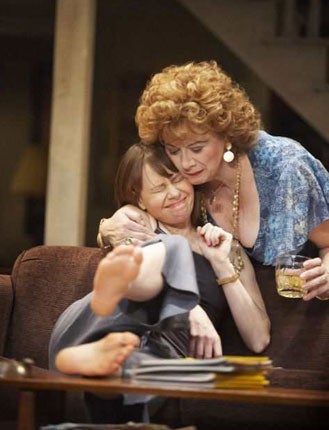August: Osage County, National Theatre: Lyttelton, London
Riveting roller-coaster is an American classic

Having won six Tony awards on Broadway and the Pulitzer Prize for its author, Tracy Letts, August: Osage County was asking for its comeuppance on arrival at the National Theatre.
Much as I'd like to kick-start a chorus of disapproval, the most I can do is nitpick about the final moments of the play, for this stunning import from Steppenwolf in Chicago is indeed one of the truly great nights of American theatre.
It's high hot summer in Osage County, the "native American" term for the Oklahoma plains west of Tulsa, where the suffocating temperature is too much even for Violet Weston's string of parakeets, all of whom have fallen off the perch. Vi's a pill-popping matriarch, drifting away from her family in a miasma of drug-induced dopiness but full of sudden vicious anger over daughters who return home after high-tailing it away to Colorado and Florida.
The family gathers for a reunion caused by a funeral. It's no accident that Vi's husband Beverly, a clapped-out 1960s poet and academic, is quoting TS Eliot at the Cheyenne housekeeper he's just hired in the first scene. This girl, Johnna, silently serving the meals when not locked away in the attic, and beautifully played by Kimberly Guerrero, is sensible enough to keep her own family in memorial form, along with her own umbilical cord tucked into a broach worn round her neck.
In contrast, the Weston crowd are a noisy mob. Even the quietest middle-aged daughter, Sally Murphy's oppressed Ivy, is subjected first to a maternal lecture on not wearing make-up – "The only girl pretty enough not to wear make-up was Elizabeth Taylor; and she wore tons of it" – and then to criticism of her black trouser-suit for the funeral. No wonder she's developed an incestuous crush on her first cousin, the equally battered "Little" Charlie (Ian Barford).
Big Charlie, his dad, is an upholsterer saddled with Vi's sister, the riotously raucous Mattie who, in Rondi Reed's knockout performance, is also harbouring a dark secret. And in Ivy's sisters Barbara and Karen, we see the classic guilt-peddling syndrome of birds flying the nest only to return and find themselves blamed for taking wing thanks to their parents' efforts.
London hasn't seen an ensemble acting troupe of this quality for many years – probably not since Steppenwolf last came to the National in 1989 with their definitive The Grapes of Wrath – and Amy Morton as Barbara, and Mariann Mayberry as Karen, show you why.
Morton's Barbara is a college librarian in Boulder, Colorado, whose teacher husband Bill (Jeff Perry) is having an affair with a student. As the play develops, their marital crisis seeps into Morton's astonishing performance of despairing strength, while her own pot-smoking teenage daughter (Molly Ranson) grows apart and closer to the housemaid. Mayberry's Karen is an estate agent in Florida whose family ties have been tainted with West Coast superficiality and the acquisition of a deeply untrustworthy fiancé (Gary Cole); the emotional mix on stage becomes potentially explosive.
The recital of grace at the dinner party after the funeral becomes as fraught and hilarious as the one in Ayckbourn's The Norman Conquests, while the bitching over status symbols and past indiscretions has all the hallmarks of a wild conjunction of Albee and O'Neill. At root, Vi's plaintive, accusatory wail that "we lived too low and rose too high" sums up the anxiety over self-improvement and mobility in a country that has lost its way spiritually both in the home and on the world's stage.
Anna D Shapiro's production is a masterpiece of mood, control and impassioned outbursts as the play seems to start spiralling into ever crazier revelations and violence. I was puzzled only by the ambiguous exit of the exhausted Barbara and the strained manufacture of a final pieta as Johnna cradles the whimpering, unreformed and justly abandoned Vi. But the evening is a riveting three-and-a-half hour roller-coaster on designer Todd Rosenthal's three-storey country house you would be mad to miss. The National has excelled itself by hosting the year's most memorable play.
Join our commenting forum
Join thought-provoking conversations, follow other Independent readers and see their replies
Comments
Bookmark popover
Removed from bookmarks